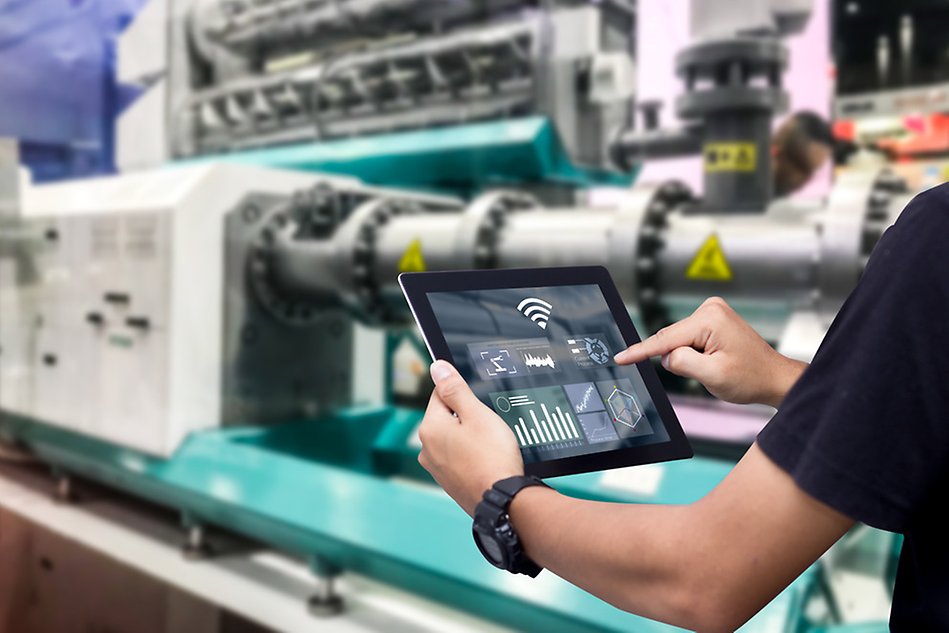Halmstad University educates engineers on the fourth industrial revolution
The fourth industrial revolution means that industry must be digitized. Halmstad University is leading the Industry 4.0 project, which is a collaboration between several universities and industry in order to equip the industry for the digital transition. The project now receives an additional SEK 30 million from Vinnova to develop a smorgasbord of short internet-based training modules. The modules are aimed at both professional engineers and university students at the advanced level.
“The fourth industrial revolution takes digitalisation a step further. Now we are moving from traditional mechanical engineering to using so-called cyberphysical systems – computer-based systems that interact with machines through sensors that collect data from the environment.”
Bengt-Göran Rosén, Professor in Mechanical Engineering
The first industrial revolution meant a transition from an agricultural society to an industrial one, a development that was driven by the possibility of mass production with mechanical aids. The second industrial revolution was marked by the introduction of electricity, combustion methods and steel. The third industrial revolution, or the digital revolution, was characterized by the introduction of information technology manufacturing systems. Now, a bit into the 21st century, we have arrived at the fourth industrial revolution.
“The fourth industrial revolution takes digitalisation a step further. Now we are moving from traditional mechanical engineering to using so-called cyberphysical systems – computer-based systems that interact with machines through sensors that collect data from the environment. It is exciting, but it can also be difficult to keep up, and this is where the Industry 4.0 project wants to help”, says project manager Bengt-Göran Rosén, Professor in Mechanical Engineering.
Course modules for both students and professionals
In collaboration with the Production Academy, which brings together Swedish higher education institutions that conduct education and research within the production and manufacturing industry, Halmstad University, together with other higher education institutions, has developed a number of course modules.
“From the beginning, it was thought we were going to use the modules in our engineering programmes, but then came the covid pandemic and suddenly we saw a huge need for skills development in the industry. We were quick to switch focus and instead produce a number of different digital courses that employees in the industry could take part in at a distance. We worked together with the industrial companies and developed a system for e-learning which we call Ingenjör 4.0.”, says Bengt-Göran Rosén.

The fourth industrial revolution takes digitalisation a step further. Now we are moving from traditional mechanical engineering to using so-called cyberphysical systems – computer-based systems that interact with machines through sensors that collect data from the environment.
Strengthening Sweden's global innovation and competitiveness
It all started in 2019 when the government launched four strategic collaboration programs to strengthen Sweden's global innovation and competitiveness and meet major societal challenges. One of the programs focuses on skills supply and lifelong learning and another deals with the digital structural transformation of business and industry.
“The programs are led by groups of people who have the task of creating innovative solutions to various societal problems. Several of the members of the groups come from industry, or from The Swedish Association of Graduate Engineers or from Teknikföretagen (the Association of Swedish Engineering Industries), and had encountered Industry 4.0 before. They cited it as a good example, and as a result we were asked to send in an application for additional funding to Vinnova”, says Bengt-Göran Rosén and explains that the money will be used to develop even more course modules:
“We received SEK 30 million to be used to run the project further, among other things by developing more courses. We now have 15 course modules and the goal is to offer 48. We also work with the methodology and pedagogy around the educations, and with how we can package the modules to suit different professional groups. The idea is that we should be able to use the lessons we collect in other projects that are centered around lifelong learning.”
Both digital learning and practical elements
Even if the basis of the course modules is digital, participants also get to meet with the teacher and the other course participants. Bengt-Göran Rosén emphasizes that the personal meeting is important:
“Even with distance learning, the participants need a chance to meet and talk with the teacher and with the others who take the course. Therefore, webinars are included in all courses. In addition, we have worked on developing mobile lab kits for some of the courses. We have lab-equipped a trailer that can be rolled out to the companies that buy the courses. In engineering education, practical work is important, and in this way, we can offer equipment even if it is not available at the site of the company in question.”
The interest in the project is great, not only nationally but also outside Sweden's borders.”
We have received requests for cooperation from both Slovakia and Finland, and hopefully the project can spread”, says Beng-Göran Rosén and concludes:
“This is a very interesting project to work with, and I think it’s great that Halmstad University has the coordinating role. We have come a long way, but there is still a lot to do, and it is extremely exciting.”
Text: Christa Amnell
Bild: iStock

